Why Distance Matters
Putting the ‘Geo’ Back into Politics
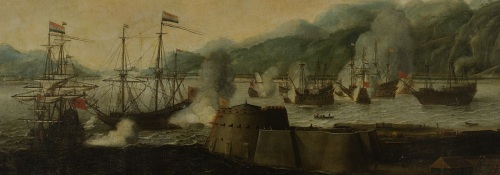
Dutch East India Company (VOC) forces attack Goa, the capital of Portugal’s State of India.
The Dutch and their ally England, battled Portuguese and Spanish forces in Europe, the Americas, Africa, South Asia and Southeast Asia, throughout the XVII century. Some called it the first world war.
in RUSI
by Patrick Porter
Humans of the Western world still think their planet is a small place. Their collective perceptions are framed by the image of a shrinking globe, both dangerously closing in and comfortably within reach; but they are confounded when distance gets its revenge. In March 2014, Malaysian Airlines flight MH370 went missing somewhere in the Indian Ocean. Investigators searched in vain with dozens of ships and planes over an area of roughly 60,000 km2 , far off the west coast of Australia. Observers expressed surprise and alarm that the aircraft had disappeared so easily. Implicit in this reaction was an instinctive assumption that modern technologies with their panoptic tracking power had shrunk the earth, and that the human eye, aided by modern surveillance tools, should be able to impose its gaze far and deep into any area of the planet. The ‘mental maps’ people carry condition their expectations. This is a time when smartphones and GPS encourage the conceit that one can hold and rotate the globe in one’s hands. The architects of Google Maps, like many ambitious cartographers since the Renaissance, aspire to create visualisations of the globe that ‘mirror the earth in a transparent act of representation’. 1 However, this can mislead. Boris Johnson, the mayor of London, noted in March 2014: 2 [W]e thought that they could see everything: whether through CCTV or looking at your internet account or tracking your movements by the signal of your mobile phone. Now we learn that it is still a world so vast that an object as unmistakeable as a Boeing 777 – 200ft long, 200ft broad and six storeys high – can vanish.
The loss of the flight was a reminder that oceans are still large by any measure, and people are not guaranteed mastery of them. As an anxious audience tuned in impatiently for the news of discovery they expected, distance re-imposed itself. It was surprising, because distance is a force often presumed weakened by globalisation – the circulation of people, ideas, materials and capital. Yet in this instance, distance made its force felt through the sheer expanse of space, and because even with data feeds and satellite platforms, it is not possible to monitor everything. Unlike the behemoth of an aircraft carrier joined by a flotilla, which systems are geared to detect, this was a single plane making a routine journey, and it consequently represented a tiny speck over the seascape. Realisation of the relative vastness of space, and the difficulty of mastering it, is an important step in appreciating the limits of power. If one recognises the globe as a large space strategically, that insight can be a source of a realistic conceptualisation of national security. As the UK looks towards its next defence review, it is important to think again about the widespread assumption that today’s world is shrinking and that, to survive, the West must continually and globally expend its power. Indeed, the basic premise underlying these fears is unsound. Technology does not kill distance with anything like the decisive power often attributed to it. The notion of a world shrinking is both flawed and pernicious. It encourages a mixture of inflated fear and confidence, leading to self-defeating behaviour. Without lapsing into isolation, the double-edged effects of technology and the agency of states mean that there is an ‘over here’ and an ‘over there’ after all. Of course, at a basic level it is true that hijackings, intercontinental missile strikes or cyber-assaults were unknown a century ago. New instruments from the aircraft carrier to the Internet do strengthen and extend the reach of war-makers. In fact, globalisation is an older phenomenon than is widely presumed. The telegraph spread and accelerated communication in the nineteenth century. Major wars have stretched into worldwide combat since at least the eighteenth century; countries fought the Seven Years’ War of 1756–63 in and around Europe, North America, South America, Africa and Asia, for example. Such factors notwithstanding, however, it does not follow that distance no longer constrains power. Visions of the globe as interconnected and intrinsically dangerous are overstated. Distance is better seen not as a physical thing erased by globalisation, but as a strategic creation that humans continually reinvent. The conflation of physical and strategic space is a source of confusion. Robert Kaplan’s Revenge of Geography makes a robust case for acknowledging the power of space in the security debate. 3 However, Kaplan jumbles ‘geography’ (the physical environment) with ‘geopolitics’ (human political interactions with space). 4 Here, space is not the pathway of the tourist, but of the war-maker; and it is violently contested, with competing sides attempting to convert geography into a shield orahighway.
 For example, in 1940, because of Britain’s large surface fleet, its air-defence system and the location of the battle, the English Channel proved a more formidable and strategically wider barrier to Nazi interlopers than the Atlantic Ocean did to the victims of the Conquistadores in the sixteenth century.5 Innovations and instruments, used with political will, can stretch and fortify space, making it more difficult to project power at affordable cost. In this way, while technology may accelerate movement and compress physical space, it does not necessarily shrink strategic space in a way that enhances the ability to project power affordably across the earth. If the world is strategically wide, not small, then we are less powerful but more secure than we think.
For example, in 1940, because of Britain’s large surface fleet, its air-defence system and the location of the battle, the English Channel proved a more formidable and strategically wider barrier to Nazi interlopers than the Atlantic Ocean did to the victims of the Conquistadores in the sixteenth century.5 Innovations and instruments, used with political will, can stretch and fortify space, making it more difficult to project power at affordable cost. In this way, while technology may accelerate movement and compress physical space, it does not necessarily shrink strategic space in a way that enhances the ability to project power affordably across the earth. If the world is strategically wide, not small, then we are less powerful but more secure than we think.
The World is Flat? The Anxieties of Globalism
One claim unites politicians, military chiefs, aid experts, journalists, vice chancellors and business leaders: that globalisation compresses the world. It does so, allegedly, to the extent that distance hardly matters as a buffer for security. New tools and pathways confer new mobility. The supposed ‘death of distance’ is a fear that haunts policy-makers and commentators when estimating threats and risks. In particular, they assume that in a more interwoven world, the projection of violence is getting easier. The former head of MI6, Sir John Sawers, warns of a ‘much flatter’ and therefore ‘more dangerous’ world. 6 The Investor’s Business Daily claims that ‘It’s hard to remember a time of greater danger for the world than today.’ 7 So much for the Cold War. On both sides of the Atlantic, leaders of the security profession are so impressed by the dangers of globalisation that the long, complex competition with Soviet communism now appears stable and simple by comparison. For Britain’s former Chief of the Defence Staff Lord Richards, ‘The world today is not a safer place and the distinction between home and abroad is strategically obsolete.’8 This fear echoes in many ways. Some fear that the combination of apocalyptic intentions, deadly weapons and dangerous access makes terrorists a first-order threat. Now that Daesh (also known as the Islamic State of Iraq and Syria) has seized a foothold in Libya, this fear has grown stronger, allegedly turning the country into ‘the gas station, ATM and airport for ISIS.’ 9 Some fear that the Internet, the quintessential manifestation of globalisation, can function as a transnational training camp, enabling radicals to download instruction manuals in their basement.10 In a more fluid world, some fear that the cyber-domain as a new man-made geography means that state and non-state actors armed with electrons can assault power grids and even subvert nation-states. If cyber-war is hostile action by networked computers against networked computers for political purposes, it enables actors to bypass terrestrial barriers and inflict direct hits on an adversary’s critical control systems: air-traffic control, electrical grids or weapons-control systems. In the words of former US Secretary of Defense Leon Panetta, this could result in an ‘electronic Pearl Harbor’.11 Beyond terrorism, there are other linked fears. Economic globalisation allegedly implicates the West’s security in almost any conflict. Vulnerable trading economies like the UK, allegedly, cannot live with a rupture of commerce between other states. The proliferation of global media creates a wide audience, encouraging the perception of the world as a single battlespace, where observers’ emotions can be ignited by a single incident even far away, putting the West’s credibility everywhere on the line. In the Asia-Pacific, some fear that new precision, long-range weapons technologies create ‘offence dominance’. 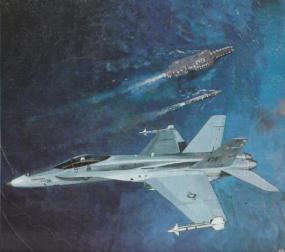 China’s development of greater ‘reach’ through a blue-water navy, on the back of prodigious economic growth, has generated concern for different reasons, rooted in the possibility of a disastrous inter-state war or of a dangerous shift in the military balance in Beijing’s favour, so that it can cast its shadow over Asian states. Achieving dominance without shedding blood, China’s economic and military progression could present the world with an altered balance that would make states in its shadow jump on the bandwagon, maybe even locking the US out of the East Asian part of the global commons, imposing a kind of geopolitical stranglehold increasingly feared by American strategists.12 In its confrontation with Taiwan, for instance, China could deploy its military as part of a wider strategy of tightening the noose, through a military build-up, economic penetration, the cultivation of political and commercial elites, deterrence, and isolating and weakening Taiwan to the point where it ‘has no choice but to cut the best deal it can with the mainland’. 13 The question, then, is what this all amounts to. If geography is no longer a meaningful barrier – if the ‘security world’ is flat – then states like the UK conceive their security in unbounded ways, tying their welfare to the continual expansion of liberalism. The notion that one’s security depends on the creation of liberal subjects abroad is an old one, more recently revived in Prime Minister Tony Blair’s ‘Chicago Speech’ of April 1999. In this, Blair recast security as a problem of interdependence, in which Western security interests were universal because the divide between ‘over here’ and ‘over there’ had collapsed.14 The 9/11 attacks re-entrenched globalism as an orthodoxy. It was the most momentous strategic shock for the US-led West between the collapse of the Soviet Union and the Great Recession of 2007–08. In the interpretation of the most influential foreign-policy minds, the eruption of the politics of the Middle East in Manhattan was ‘caused’ by the international community’s neglect of Afghanistan and Pakistan, and the only viable response was a ‘global strategy’, in the words of the 9/11 Commission.15 Testifying before the 9/11 Commission, terrorism expert Magnus Ranstorp argued that ‘The world is truly a global village today and it has been made even more real than ever with September 11th … the global community cannot allow conflict in one part of the world to fester–principally because, sooner or later, it has the propensity to reach around the globe.’16 Taking offensive action had become easy – it was argued–even for the traditionally weak. 9/11 was not an aberration but a harbinger of things to come, flowing from ‘failed states in a world of terror’.17 The UK’s efforts to define a space of interest in the Strategic Defence Review of 1998 was eclipsed as a transatlantic doctrine of globalism emerged; in Blair’s words, ‘let us reorder the world’. In 2015, following the long campaigns in Iraq and Afghanistan, policy-makers are wary of large-scale land commitments.
China’s development of greater ‘reach’ through a blue-water navy, on the back of prodigious economic growth, has generated concern for different reasons, rooted in the possibility of a disastrous inter-state war or of a dangerous shift in the military balance in Beijing’s favour, so that it can cast its shadow over Asian states. Achieving dominance without shedding blood, China’s economic and military progression could present the world with an altered balance that would make states in its shadow jump on the bandwagon, maybe even locking the US out of the East Asian part of the global commons, imposing a kind of geopolitical stranglehold increasingly feared by American strategists.12 In its confrontation with Taiwan, for instance, China could deploy its military as part of a wider strategy of tightening the noose, through a military build-up, economic penetration, the cultivation of political and commercial elites, deterrence, and isolating and weakening Taiwan to the point where it ‘has no choice but to cut the best deal it can with the mainland’. 13 The question, then, is what this all amounts to. If geography is no longer a meaningful barrier – if the ‘security world’ is flat – then states like the UK conceive their security in unbounded ways, tying their welfare to the continual expansion of liberalism. The notion that one’s security depends on the creation of liberal subjects abroad is an old one, more recently revived in Prime Minister Tony Blair’s ‘Chicago Speech’ of April 1999. In this, Blair recast security as a problem of interdependence, in which Western security interests were universal because the divide between ‘over here’ and ‘over there’ had collapsed.14 The 9/11 attacks re-entrenched globalism as an orthodoxy. It was the most momentous strategic shock for the US-led West between the collapse of the Soviet Union and the Great Recession of 2007–08. In the interpretation of the most influential foreign-policy minds, the eruption of the politics of the Middle East in Manhattan was ‘caused’ by the international community’s neglect of Afghanistan and Pakistan, and the only viable response was a ‘global strategy’, in the words of the 9/11 Commission.15 Testifying before the 9/11 Commission, terrorism expert Magnus Ranstorp argued that ‘The world is truly a global village today and it has been made even more real than ever with September 11th … the global community cannot allow conflict in one part of the world to fester–principally because, sooner or later, it has the propensity to reach around the globe.’16 Taking offensive action had become easy – it was argued–even for the traditionally weak. 9/11 was not an aberration but a harbinger of things to come, flowing from ‘failed states in a world of terror’.17 The UK’s efforts to define a space of interest in the Strategic Defence Review of 1998 was eclipsed as a transatlantic doctrine of globalism emerged; in Blair’s words, ‘let us reorder the world’. In 2015, following the long campaigns in Iraq and Afghanistan, policy-makers are wary of large-scale land commitments.
 Nonetheless, Blair’s doctrine predominates and the assumption persists that, because of ever-closer linkages, survival rests on the interior stability of fragile states. Some of ‘Blair’s Generals’ argue that Britain must maintain an army designed to intervene in failing states, lest they allow ‘countries like Afghanistan to fester. The world, and our lives, will become more dangerous and gradually our global system will wither’. 18 This nightmare of a shrinking world has a flipside. It encourages the corollary: that the US-led West, with its own reach and vision, can act as the guardian of world order by projecting power benignly and with the prescience to intervene early to prevent threats materialising – that it can shape global security by bringing order to chaos. Britain’s declaratory strategic documents – its 2010 Strategic and Security Defence Review (SDSR),19 and the manifesto it served, the National Security Strategy (NSS) 20 – articulate the logic. As the incoming government has left open the possibility of further cuts, renewed debate about the basis and parameters of Western interventionism will be hard to avoid. This is part of an older story. Since it emerged as a self-consciously global superpower between 1945 and 1950, the US has fashioned itself as the ‘world’ state, redesigning the world through the architecture of the NATO Alliance, the UN, the Bretton Woods settlement and the dollar as reserve currency. ‘Global governance’ as an agenda for government is staked on the assumption that the US and its allies can extend the norms and institutions of a liberal order. This order can take pride in many achievements; but it also carries the temptation for the US-led West to regard itself unreflectively as the bringer of order to chaos, rather than as fallible states with limited knowledge which can unwittingly propagate chaos in the name of upstream engagement. By rejecting geographical limitation, it makes the concept of security dangerously unbounded. According to John Ikenberry, Washington’s long-term ‘deep global engagement’ represents the triumph of the liberal order over geopolitics, because the strength and appeal of the Atlantic ‘way’ makes futile any territorial struggles for spheres of influence, or any effort to counterbalance the superpower.21
Nonetheless, Blair’s doctrine predominates and the assumption persists that, because of ever-closer linkages, survival rests on the interior stability of fragile states. Some of ‘Blair’s Generals’ argue that Britain must maintain an army designed to intervene in failing states, lest they allow ‘countries like Afghanistan to fester. The world, and our lives, will become more dangerous and gradually our global system will wither’. 18 This nightmare of a shrinking world has a flipside. It encourages the corollary: that the US-led West, with its own reach and vision, can act as the guardian of world order by projecting power benignly and with the prescience to intervene early to prevent threats materialising – that it can shape global security by bringing order to chaos. Britain’s declaratory strategic documents – its 2010 Strategic and Security Defence Review (SDSR),19 and the manifesto it served, the National Security Strategy (NSS) 20 – articulate the logic. As the incoming government has left open the possibility of further cuts, renewed debate about the basis and parameters of Western interventionism will be hard to avoid. This is part of an older story. Since it emerged as a self-consciously global superpower between 1945 and 1950, the US has fashioned itself as the ‘world’ state, redesigning the world through the architecture of the NATO Alliance, the UN, the Bretton Woods settlement and the dollar as reserve currency. ‘Global governance’ as an agenda for government is staked on the assumption that the US and its allies can extend the norms and institutions of a liberal order. This order can take pride in many achievements; but it also carries the temptation for the US-led West to regard itself unreflectively as the bringer of order to chaos, rather than as fallible states with limited knowledge which can unwittingly propagate chaos in the name of upstream engagement. By rejecting geographical limitation, it makes the concept of security dangerously unbounded. According to John Ikenberry, Washington’s long-term ‘deep global engagement’ represents the triumph of the liberal order over geopolitics, because the strength and appeal of the Atlantic ‘way’ makes futile any territorial struggles for spheres of influence, or any effort to counterbalance the superpower.21
Bringing Distance Back In
The vision of a shrinking globe superintended by a ‘global policeman’ and its allies has weighty policy implications. It leads to a logic of ‘threat eradication’, where states pursue absolute security by destroying opponents, as opposed to containment, where states might seek to limit and interdict the capabilities of adversaries more incrementally. Visions of the West’s far-flung interests underpin the call for ever-more garrisoning and counter-insurgency ground wars in the future.22 It drives the movement towards a permanent state of exception and emergency, where the state accumulates new powers with few checks or scrutiny. The ‘axiom’ that the West must tame a dangerous globalised world into order loses sight of how those with good intentions can sow the chaos they seek to prevent. The invasion of Iraq – and the subsequent effort at armed nation-building – replaced a Ba’athist regime not with an open, pluralistic market democracy, but with a dangerous power vacuum, communal conflict and then a predatory sectarian Shia ascendancy in Baghdad. This then led to further revolt and the rise of Sunni Islamists who stormed the north of the country armed with US-supplied weapons. The disintegration of Libya as a direct result of a ‘model’ humanitarian intervention in 2011 has accelerated, not prevented, the fracturing of the country, worsening human-rights violations and disruption of oil production. UK foreign aid, intended to be an instrument of global through the stabilisation of fragile states, has resulted at times in perverse consequences. For instance, the UK recently donated tens of millions of pounds to Rwanda, in a joint commitment ‘to the promotion of peace and stability in the Great Lakes Region’; yet these funds were reportedly misspent by the country’s regime to support M23 rebels in the Democratic Republic of the Congo.23
The cosmology of the ‘small world’ also promotes a kind of ‘binary’ oversimplification of national-security debates. To frame international life as a stark morality play, rather than a tragedy based on limitation and compromise, is to impoverish the negotiation of complex questions into a binary language of ‘international’ versus ‘isolation’, denying what Hans Morgenthau called ‘that middle ground of subtle distinctions, complex choices, and precarious manipulations, which is the proper sphere of foreign policy’.24 Distance should be brought back into appraisals of security, for two reasons. First, observing its dynamics demonstrates that the world is less intrinsically deadly than globalists assume. Second, it is a useful conceptual way of defining, ranking and limiting the national interest. With regard to the first, distance at one level is a physical thing, meaning simply ‘that space which separates’. Contemporary digital existences rely on physical infrastructure and the command of real terrain, often a logistically intensive exercise. Those Britons who suffer ‘sea blindness’ forget that they still feed, clothe and provide for themselves primarily through international shipping, which represents 90 per cent of their trade. 25 Even cyberspace, that ‘virtual’ geography whose electronic insecurity attracts so much alarm, relies on underwater cables that convey 95 per cent of the world’s intercontinental communications traffic, which in turn depend on physical defences.26 The notion that today’s world is a de-territorialised, borderless world of flows loses sight of the highly geographical realities of most humans. Life for many people remains highly localised. Ninety-seven per cent of people in the world do not live outside the country of their birth. Only 2 per cent of students go to university abroad.27 In Britain, most online communication via smartphones and the Internet happens within a 100-mile radius, and most follow traditional geographic and historical divides, with only 9.5 per cent of communications crossing an invisible border between the north and south of the country.28 Even DHL’s Global Connectedness Index observes that ‘Distance and borders still matter–even online. Most international flows take place within rather than between regions. Even online connections are mainly domestic and decline with distance’.29 As this suggests, distance is best appreciated also as a political property, an interplay of location, will and technology. If distance imposes a friction beyond just a physical one, it affects and often constrains the projection of power in more complex ways. George Kennan once remarked that ‘the effectiveness of the power radiated from any national centre decreases in proportion to the distance involved.’30 There are notable exceptions to this observation – think of the United States’ successful occupation and transformation of Japan after 1945 – butsuccessful power projection from afar is difficult without high levels of consent. In the world of armed conflict, the effects of distance are many. It can take the form of an imbalance of will.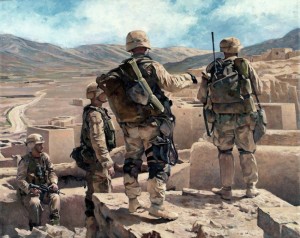
Consider, for example, the experience of Western armed forces in Afghanistan. Projecting power into Central Asia, they came up against the Taliban, ‘tough opponents capable of sustained resistance against better-equipped, numerically superior forces’. 31 For Britain, coming from afar to battle insurgents who remain within or near to the theatre of operations, this generated the hardest fighting since the Korean War. Materially weaker sides fighting at home against stronger but distant Goliaths often have a political advantage. As the materially stronger side defines its interests and what it is willing to bleed for, the ‘farness’ of the battleground may lead it to value the struggle less than its weaker opponent fighting at home. Conversely, their weaker opponents – be it, through the ages, the American revolutionaries, the Vietnamese communists or the Afghan Taliban – are more tolerant of the costs, fighting for what they value closer to home and thus with more of a dog in the fight.32
If one recognises distance as something pertaining to political power as well as physical space, the sovereign state remains a formidable force. Globalisation is mediated by the agency of states, particularly strong ones. Most people remain nationalised subjects in today’s regimes of gate-keeping. States increasingly erect walls and complement them with barriers such as no-fly lists, biometric passports and surveillance cameras. Migrants needing travel visas face a level of scrutiny that their ancestors would have found absurd. Hence the paradox that states that preach the rhetoric of a borderless, connected world do not always practise it, jealously guarding their sovereignty when they choose. Globalisation fluctuates but it is shaped by great powers. It is not an ineluctable force like the weather. It is more a choice than a fact. Human innovations can enlarge as well as shrink that space.
Consider East Asia’s maritime peripheries, where new weapons and instruments have widened, rather than shrunk, the Asia-Pacific. Tools of ‘access denial’ – such as long-range anti-ship missiles – may be bringing about an age of ‘sea denial’, creating exclusion zones where the relative ease of striking ships from land makes it easier for states to fend off enemy fleets and raises the costs of aggression. Surveillance assets in the hands of watchful defenders make it harder to inflict a sudden, surprise long range attack such as that on Pearl Harbor in 1941. Even weaker enemies can inflict a devastating sting on aggressors. This makes it harder for the US to intervene in a war, for instance, around the Taiwan Strait – but harder also for China to expand.33 Conquest over water against determined defenders appears increasingly and prohibitively costly. Opposed amphibious assaults–the ultimate attempt to translate forces from one geographical medium to another under fire–appear ever-more difficult. The problems flowing from the increasing striking range of defenders are reflected in the projections of future campaigns by the US Marine Corps, the world’s premier amphibious force. Its ‘Expeditionary Force 21’ concept reflects expectations that ever-longer-range capabilities, along with cheap sensors like nautical radar, ‘will force the fleet to stay at least 65 nautical miles offshore, a dozen times the distance that existing Marine amphibious vehicles are designed to swim’. 34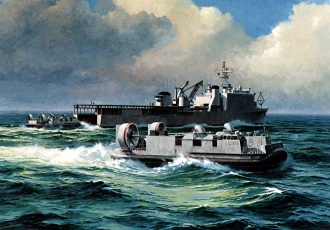
For at least fifteen years, the focal point for British security anxiety has been ‘failed’ and ‘fragile’ states as incubators and staging posts of international terrorism. The first problem with the ‘failed states’/‘weak governance’ alarm is that Islamist terror networks have found that the most effective sanctuary lies within strong, tolerant states or spaces. According to Prime Minister David Cameron, northern Iraq is attractive to terrorist groups as an ‘ungoverned space’. 35 In fact, Daesh seeks statehood and the firm governance of space, as those on the receiving end of its ‘morality patrols’ can attest. Elements of a strong, well-armed, well-funded security service, the Pakistani Inter Services Intelligence (ISI), are the covert sponsors of the Taliban. Al-Qa’ida’s funding flowed not from the coffers of an impoverished ‘Third World’ regime, but from well-placed financiers in Saudi Arabia. More vulnerable and fragmented states, such as Somalia, prove more open to military countermeasures, more difficult to operate in secretly, and are subject to the same terrors such as kidnapping, extortion and assassination that endanger aid agencies.
Second, turbulent vacuums of power are unsafe for most of those residing in them and are usually not reliable hosts for plotting complex, large-scale attacks abroad.36 Terrorist groups need a baseline of political order, access to resources and functioning infrastructure from which to operate securely. 37 Most effective terrorists do not come from ‘failed states’ but from strongly governed states such as Saudi Arabia or Afghanistan when it was a strongly governed theocracy, and most failed states do not host organisations identified by the US State Department as ‘terrorist’.38 There is also intermediate space between ‘ungoverned’ peripheries and cores. The events of 9/11 were highly contingent and almost failed.39 The attacks were only made possible by a range of glaring weaknesses in the national security ‘net’ that are now being addressed. As evidence heard in court cases since suggests, the operating environment now is not the same as that which prevailed before September 2001, when hijackers passed undetected through border security sixty-eight times and operated freely in nine states, and when the FBI and CIA between them missed twenty-three opportunities to disrupt the plot. When Al-Qa’ida attacked under open skies, Bin Laden’s pilots hit the US not directly from Afghanistan, but from forward operating bases such as flight schools in Arizona and meeting houses in Berlin, bases that the US quickly shut down in the aftermath. The US-led coalition destroyed Al-Qa’ida training camps and sanctuaries in Afghanistan. Actual capabilities are not developed easily from a remove. They require experiential as well as abstract knowledge. Few self-starting cells or lone wolves have succeeded without direct, expert instruction. Contrary to the views of alarmists, proficient tradecraft is not acquired rapidly just by downloading information from the Internet. The many failed efforts by incompetent visionaries testify to a high level of incompetence in the field. ‘Learning’ still requires an intimacy that technology alone cannot erase. In short, abstract knowledge does not necessarily equate to real capability; a haven is not necessarily ‘safe’, particularly after 9/11; sanctuary does not necessarily translate into reach; and reach does not necessarily penetrate defences. The unspectacular steps of intensified police work, tighter border controls, international collaboration, and strengthened airport security widened the space between Al-Qa’ida and the US. The fear that the Internet empowers radicals to the extent that they represent first-order threats is also inflated. Tools emerging in the age of globalisation that are credited with empowering non-state actors such as Al-Qa’ida can also empower their adversaries. Information technology can facilitate decentralisation and networking, but it can also place groups on a grid to be watched and intercepted. Information technology can also be used to create databases, collate and distribute intelligence, and map insurgent groups.40 The power to broadcast can come at the expense of discretion. Strikingly, Osama bin Laden lived in a remarkably low-tech fashion for a figure observers had characterised as a hi-tech cybernetic mastermind who inspired jihad from behind encrypted software. This was revealed by the state of his compound in Abbottabad. 41 To avoid detection, he avoided the Internet. He had no phone. He relied on couriers to communicate. He only dared meet donors personally. Such was the pressure applied by US intelligence and military forces that he had trouble sending the simplest communications. The information superhighway was emphatically not a freeway. Against prepared defenders, it was a dangerous two-way zone of hostility where he could be hunted. There is a more general worry about the fragility of the globalised world. This is the fear that economic interdependence means the international community cannot tolerate military political disruption in important regions. This fear is surprisingly under-assessed. Stability abroad and the security of trade is obviously desirable, hence the need to protect sea lanes. However, economic national survival is not necessarily threatened by eruptions of war between other parties. Historical periods of regional turmoil in times of interdependence – such as for the US economy when it was a neutral during the First World War, and for oil-importing neutrals during the Iran–Iraq War of 1980–88 – suggest that outside parties can adapt by switching to the ‘new best’ way of doing business, entering markets formerly served by the belligerents, lending money at lucrative rates, and sometimes even benefiting.42 Eruptions of war between states are obviously unwelcome, but conflicts abroad do not necessarily pose existential economic threats that require the West to expend resources everywhere to prevent them. So What?
‘Learning’ still requires an intimacy that technology alone cannot erase. In short, abstract knowledge does not necessarily equate to real capability; a haven is not necessarily ‘safe’, particularly after 9/11; sanctuary does not necessarily translate into reach; and reach does not necessarily penetrate defences. The unspectacular steps of intensified police work, tighter border controls, international collaboration, and strengthened airport security widened the space between Al-Qa’ida and the US. The fear that the Internet empowers radicals to the extent that they represent first-order threats is also inflated. Tools emerging in the age of globalisation that are credited with empowering non-state actors such as Al-Qa’ida can also empower their adversaries. Information technology can facilitate decentralisation and networking, but it can also place groups on a grid to be watched and intercepted. Information technology can also be used to create databases, collate and distribute intelligence, and map insurgent groups.40 The power to broadcast can come at the expense of discretion. Strikingly, Osama bin Laden lived in a remarkably low-tech fashion for a figure observers had characterised as a hi-tech cybernetic mastermind who inspired jihad from behind encrypted software. This was revealed by the state of his compound in Abbottabad. 41 To avoid detection, he avoided the Internet. He had no phone. He relied on couriers to communicate. He only dared meet donors personally. Such was the pressure applied by US intelligence and military forces that he had trouble sending the simplest communications. The information superhighway was emphatically not a freeway. Against prepared defenders, it was a dangerous two-way zone of hostility where he could be hunted. There is a more general worry about the fragility of the globalised world. This is the fear that economic interdependence means the international community cannot tolerate military political disruption in important regions. This fear is surprisingly under-assessed. Stability abroad and the security of trade is obviously desirable, hence the need to protect sea lanes. However, economic national survival is not necessarily threatened by eruptions of war between other parties. Historical periods of regional turmoil in times of interdependence – such as for the US economy when it was a neutral during the First World War, and for oil-importing neutrals during the Iran–Iraq War of 1980–88 – suggest that outside parties can adapt by switching to the ‘new best’ way of doing business, entering markets formerly served by the belligerents, lending money at lucrative rates, and sometimes even benefiting.42 Eruptions of war between states are obviously unwelcome, but conflicts abroad do not necessarily pose existential economic threats that require the West to expend resources everywhere to prevent them. So What?
Distance still counts, then, and location is still an important guide to the national interest. What is the policy payoff? This article is not the place for setting out a detailed programme; but recognising the relevance of geopolitics would make possible a more realistic framework. In terms of the ‘policy mix’, the first inference from the analysis above is that the UK need not choose between stark alternatives, including the binary ‘globalism’ and ‘isolation’. Finding the equilibrium needed between power and commitments cannot be ducked. To insist, as did the 2010 SDSR, on ‘no strategic shrinkage’ while seriously reducing material capabilities is a basic breakdown in the means–ends balance. A workable strategy requires pragmatic adjustments in policy as well as capability. Faced with an imbalance between policy ambitions and material capabilities, states can scale back objectives to meet limited means. They can strengthen and reorganise capabilities to match ends. Or they can do neither, postpone a reckoning with the issue and, in effect, bluff. If that bluff gets called, the state is revealed to be strategically insolvent.
Britain would be better served with a carefully husbanded set of capabilities in reserve, rather than with diminishing resources frequently expended to demonstrate their usefulness. Retrenchment of global ambitions, and greater conservation of resources with geography as a guide, can be an effective way to postpone or reverse a precipitous fall.43 The UK at critical moments has willingly cut back its liabilities. The Wilson government’s pullback from ‘east of Suez’ in 1966–68 enabled the country to refocus its depleting resources away from an overextended chain of bases and towards its NATO responsibilities in Europe. In this instance, the state refocused depleted resources successfully in order to strengthen its core security interests. This does not mean abandoning NATO or formal alliances. It does mean, in the face of uncertainty, exercising a greater presumption against activism, as well as reconfiguring defences around the accumulation and conservation of reserve and surplus power. It means the avoidance of interventions except where the interests at stake are first order (fundamentally threatening the balance of power or empowering hostile actors with dangerous levels of capability), where those are not outweighed by intervention creating unintended deterioration and new vacuums, or where the liability is strictly limited in the first place. Assisting the Gulf coalition to gradually roll back Daesh meets the threshold. Contributing to the overthrow of Qadhafi or Assad does not.
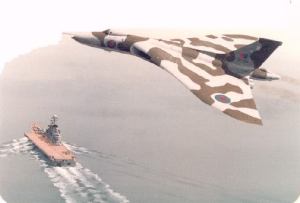 The second implication is that defence begins (but does not end) at home, and this simple principle needs reaffirmation. A state’s location should still shape its hierarchy of strategic commitments and its determination of the stake in any situation, distinguishing what is truly vital from what is desirable.44 The UK is an island, and can turn its maritime approaches into a formidable barrier. Recently, two Russian Tu-95 Bear bombers, one armed with a nuclear warhead-carrying missile, flew into the English Channel near Britain’s southern coastline and came disturbingly close to passenger planes.45 Given the backdrop of increasing probes and incursions, this is a reminder that the relative tranquillity of the UK’s environment could deteriorate.46 Britain’s core security interests lie in its ability to defend (and enlarge) its space at home, and to dissuade attempts at coercion. These imperatives are not receiving the attention they deserve. At present, the country’s commitments and its resources are out of balance. Reduced RAF Typhoon squadrons are stretched between its Quick Reaction Alert commitments, defending the Falklands and contributing to NATO’s Baltic effort. In the wider picture, given the gap between means and ends, either ‘means’ should be strengthened or commitments should be reduced.
The second implication is that defence begins (but does not end) at home, and this simple principle needs reaffirmation. A state’s location should still shape its hierarchy of strategic commitments and its determination of the stake in any situation, distinguishing what is truly vital from what is desirable.44 The UK is an island, and can turn its maritime approaches into a formidable barrier. Recently, two Russian Tu-95 Bear bombers, one armed with a nuclear warhead-carrying missile, flew into the English Channel near Britain’s southern coastline and came disturbingly close to passenger planes.45 Given the backdrop of increasing probes and incursions, this is a reminder that the relative tranquillity of the UK’s environment could deteriorate.46 Britain’s core security interests lie in its ability to defend (and enlarge) its space at home, and to dissuade attempts at coercion. These imperatives are not receiving the attention they deserve. At present, the country’s commitments and its resources are out of balance. Reduced RAF Typhoon squadrons are stretched between its Quick Reaction Alert commitments, defending the Falklands and contributing to NATO’s Baltic effort. In the wider picture, given the gap between means and ends, either ‘means’ should be strengthened or commitments should be reduced.
Securing Britain’s air and sea approaches should come first – at the expense of building the capacity for regular ground intervention. To be sure, the UK retains its nuclear deterrent, but it would be constricting to rely on this without a robust conventional means of deterrence and defence. In terms of feasibility and importance, these priorities outweigh more ambitious, costlier and less reliable projects, like armed nation-building efforts to reform states in the Arab-Islamic world. While this strategy is predominantly air–maritime, a robust defence would prepare an army optimised for combined arms manoeuvre warfare, rather than creating a ‘pentathlete’ whose capacity to deter and respond to first-order threats is diluted by the pursuit of ‘upstream engagement’ capacity. Beyond that, Britain’s security lies in the region in which it is located: its European neighbourhood where it does most of its trading. The burden of security provision in the region falls more heavily on the UK’s shoulders, especially after the US pursuit of a rebalancing towards East Asia has seen it draw down its military presence in the region, a new reality that makes imperative a negotiated division of labour between the UK and its European allies. Future contingencies in Britain’s region could include ‘known unknowns’, such as a resurgence in Russia’s bid for regional supremacy, or turmoil and the outbreak of hypernationalist or religious extremism in a politically fractured continental Europe. The security of the ‘keys that lock up the world’ and supply chains of food, raw materials and energy, as well as industrial inputs, remains crucial to trading states like Britain, and its power projection capabilities can assist the hard work of unblocking strategic chokepoints from the Danish Straits to the Strait of Hormuz. Over a longer timescale – and it is over long timescales that defences are organised –a rapidly melting and resource-rich Arctic could become a centre of competition, territorial disputes and increased economic activity, prompting rival states to ramp up military capabilities specifically attuned to exploit that environment, carve out or contest precious sea lanes, and compete for energy resources. Here is a case, as the Lords Select Committee on the Arctic has recently argued, where the UK has an interest both in working to minimise tensions with an accommodating diplomacy and in preparing for the worst, by countering aggression through maritime patrol capability, in what is becoming a ‘northern Mediterranean’.47 Encapsulated in the conflict in Ukraine and the threat of further disorder in Eastern Europe, Russia’s adventurism may be alarming but, as an economically struggling regional power that can no longer count on abundant petro-wealth, it too faces limits. Expansion has already burdened it with draining commitments, and further expansion into western Ukraine would be a march into more hostile political space, probably triggering greater resistance and insurgency. On NATO’s eastern flank, geopolitics can be brought to bear to further constrain Russia, without direct collision. NATO states could strengthen the ability of 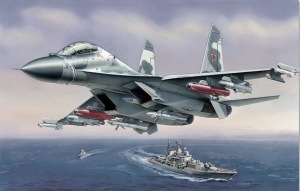 East European members to mount a preclusive defence and recapture territory from armed proxies; this would create an intermediate option between catastrophic retaliation and inaction, fortifying the space by raising the costs and, by prolonging time, the risks of outside-backed aggression.48 With regard to counter-terrorism, if threats can be disrupted and reduced at many points along the chain between ‘over here’ and ‘over there’, then the logical policy payoff is one of gradual, incremental, patient containment to lower probabilities that are already low, reducing the threat into a third order, chronic nuisance. This would entail measures already underway, but without the inflated rhetoric of threat eradication, without the rushed dismantling of civil liberties, and without the entrapment of living in a perpetual state of emergency and its continual drive to escalation. Combinations would bring together ordinary police work, international co-operation, the cultivation of intelligence within the wider community, continued efforts to secure stored weapons-grade nuclear material, with a more measured and discriminate programme of raids and drone killings to keep ‘havens’ unsafe. Two examples illustrate this. In the realm of cyber-security,a more measured strategy would involve not the panicked creation of extraordinary state powers, such as an ‘Internet kill switch’, but continuing efforts to create redundancy, to ‘air gap’ or physically isolate crucial infrastructure from unsecured networks, and enhance the capacity for attribution. In the realm of counter-terrorism, an ‘overwatch’ strategy in Libya, for example, would be a prudent response to Daesh’s presence, entailing intelligence collection, diplomatic reporting and limited military action. Daesh is constrained in a number of ways in Libya. It faces competition from other entrenched Islamist groups and lacks the kind of sectarian divide on which it capitalises in Iraq and Syria. Furthermore, Libya’s geography works against it in two ways. Its long coastal shoreline opens it to direct military access. Its big oil installations lie deep in the interior and are protected by other militias, making it considerably more difficult than in Iraq to turn oil reserves into a source of financing from local markets, while the exportation of high volumes of oil is vulnerable to interception at sea, as US Navy SEALs demonstrated in March 2014. 49 Finally, one means of generating strategic distance is through creating greater self-reliance. If ‘root causes’ of conflict in the Middle East are to be addressed, this need not take the form of ambitious ground wars undertaken to reorder the world. Strengthened pursuit of greater energy independence and the development of alternative sources of energy would be steps towards rendering the region less centrally relevant. The Middle East is not as intrinsically important to the security interests of the UK as is often made out. Its combined GDP represents only 6 per cent of the global economy, it has only 5 per cent of the world’s population, and none of its military forces has the ability to project power beyond the region.50 Western stakes there need only be quite limited: denying preponderance of petro-wealth to any one hostile power, which is now difficult to achieve given the defensive capabilities of those states, and deterring and responding – with great difficulty – to any attempt to shut down chokepoints like the Strait of Hormuz. A central diplomatic presence in the Middle East also attracts serious costs. While modern jihadi extremism is not reducible to geopolitics, geopolitics is a core part of the story. Al-Qa’ida’s aggression was galvanised by strong US ties with the rulers of Saudi Arabia.51 The West’s strategic presence in the Middle East has enabled it, unfairly or not, to become tainted as ‘the mainstay of Israel, the shah of Iran, and conservative Arab regimes and the source of a cultural assault on Islam’.52 With the region wracked by revolution, sectarian strife and war, the dividends of decades of Western patronage in the Gulf are now on display. If the rationale for ‘deep engagement’ in the Gulf has been that it acts as a stabilising force, this demonstrably presumed too much of Western power and prescience. Outright disengagement need not be the response to this problem. However, with more distancing, the UK could benefit from less complicity as well as less reliance on autocratic regimes in the complex politics of the Middle East, and take active steps to have less of a material stake in the region. The UK government has rightly realised that Daesh can only ultimately be defeated through a new political settlement in Iraq; that this is primarily the job not of the West but for the peoples of the region; and that the US-led West can only to a limited degree shape the sectarian politics of the Gulf. This insight, more widely applied, is the foundation for a more measured and pragmatic strategy. Globalism is not just a descriptive assumption of how the world is. It is a strategic doctrine about the West taming a dangerous shrinking world back into order. It is insensitive to limits. This matters, because the strategic future is unknown, the lead times for generating defence capabilities are long, resources are scarce, and the costs of defence equipment and personnel are rising. Bringing distance back in and re-imagining the world as a large strategic place, not a small one, could make possible a wiser future.
East European members to mount a preclusive defence and recapture territory from armed proxies; this would create an intermediate option between catastrophic retaliation and inaction, fortifying the space by raising the costs and, by prolonging time, the risks of outside-backed aggression.48 With regard to counter-terrorism, if threats can be disrupted and reduced at many points along the chain between ‘over here’ and ‘over there’, then the logical policy payoff is one of gradual, incremental, patient containment to lower probabilities that are already low, reducing the threat into a third order, chronic nuisance. This would entail measures already underway, but without the inflated rhetoric of threat eradication, without the rushed dismantling of civil liberties, and without the entrapment of living in a perpetual state of emergency and its continual drive to escalation. Combinations would bring together ordinary police work, international co-operation, the cultivation of intelligence within the wider community, continued efforts to secure stored weapons-grade nuclear material, with a more measured and discriminate programme of raids and drone killings to keep ‘havens’ unsafe. Two examples illustrate this. In the realm of cyber-security,a more measured strategy would involve not the panicked creation of extraordinary state powers, such as an ‘Internet kill switch’, but continuing efforts to create redundancy, to ‘air gap’ or physically isolate crucial infrastructure from unsecured networks, and enhance the capacity for attribution. In the realm of counter-terrorism, an ‘overwatch’ strategy in Libya, for example, would be a prudent response to Daesh’s presence, entailing intelligence collection, diplomatic reporting and limited military action. Daesh is constrained in a number of ways in Libya. It faces competition from other entrenched Islamist groups and lacks the kind of sectarian divide on which it capitalises in Iraq and Syria. Furthermore, Libya’s geography works against it in two ways. Its long coastal shoreline opens it to direct military access. Its big oil installations lie deep in the interior and are protected by other militias, making it considerably more difficult than in Iraq to turn oil reserves into a source of financing from local markets, while the exportation of high volumes of oil is vulnerable to interception at sea, as US Navy SEALs demonstrated in March 2014. 49 Finally, one means of generating strategic distance is through creating greater self-reliance. If ‘root causes’ of conflict in the Middle East are to be addressed, this need not take the form of ambitious ground wars undertaken to reorder the world. Strengthened pursuit of greater energy independence and the development of alternative sources of energy would be steps towards rendering the region less centrally relevant. The Middle East is not as intrinsically important to the security interests of the UK as is often made out. Its combined GDP represents only 6 per cent of the global economy, it has only 5 per cent of the world’s population, and none of its military forces has the ability to project power beyond the region.50 Western stakes there need only be quite limited: denying preponderance of petro-wealth to any one hostile power, which is now difficult to achieve given the defensive capabilities of those states, and deterring and responding – with great difficulty – to any attempt to shut down chokepoints like the Strait of Hormuz. A central diplomatic presence in the Middle East also attracts serious costs. While modern jihadi extremism is not reducible to geopolitics, geopolitics is a core part of the story. Al-Qa’ida’s aggression was galvanised by strong US ties with the rulers of Saudi Arabia.51 The West’s strategic presence in the Middle East has enabled it, unfairly or not, to become tainted as ‘the mainstay of Israel, the shah of Iran, and conservative Arab regimes and the source of a cultural assault on Islam’.52 With the region wracked by revolution, sectarian strife and war, the dividends of decades of Western patronage in the Gulf are now on display. If the rationale for ‘deep engagement’ in the Gulf has been that it acts as a stabilising force, this demonstrably presumed too much of Western power and prescience. Outright disengagement need not be the response to this problem. However, with more distancing, the UK could benefit from less complicity as well as less reliance on autocratic regimes in the complex politics of the Middle East, and take active steps to have less of a material stake in the region. The UK government has rightly realised that Daesh can only ultimately be defeated through a new political settlement in Iraq; that this is primarily the job not of the West but for the peoples of the region; and that the US-led West can only to a limited degree shape the sectarian politics of the Gulf. This insight, more widely applied, is the foundation for a more measured and pragmatic strategy. Globalism is not just a descriptive assumption of how the world is. It is a strategic doctrine about the West taming a dangerous shrinking world back into order. It is insensitive to limits. This matters, because the strategic future is unknown, the lead times for generating defence capabilities are long, resources are scarce, and the costs of defence equipment and personnel are rising. Bringing distance back in and re-imagining the world as a large strategic place, not a small one, could make possible a wiser future.
Patrick Porter is Professor of Strategic Studies at the University of Exeter, Academic Director of the Strategy and Security Institute, and a Senior Associate Fellow at RUSI. His latest book, The Global Village Myth: Distance, War and the Limits of Power, was published in March 2015 by Georgetown University Press and Hurst.

Leave a comment